Despite recent declines, Christianity is still the most common religion among Asian Americans. About a third of Asian American adults (34%) say their present religion is Christianity, down from 42% when Pew Research Center last conducted an in-depth survey of Asian Americans, in 2012.
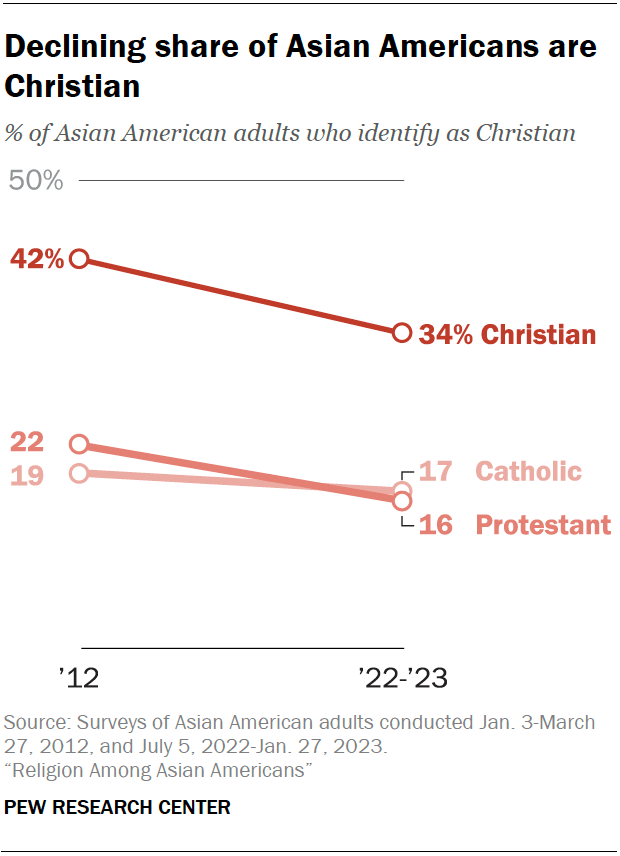
Looking at the largest subgroups within Christianity, Protestants now make up 16% of the Asian American population, down from 22% in 2012. (This includes 10% of Asian American adults who identify as born-again or evangelical Protestants, compared with 13% in 2012.) The Catholic share is more stable: 17% of Asian American adults are Catholic today, about the same as in 2012 (19%).
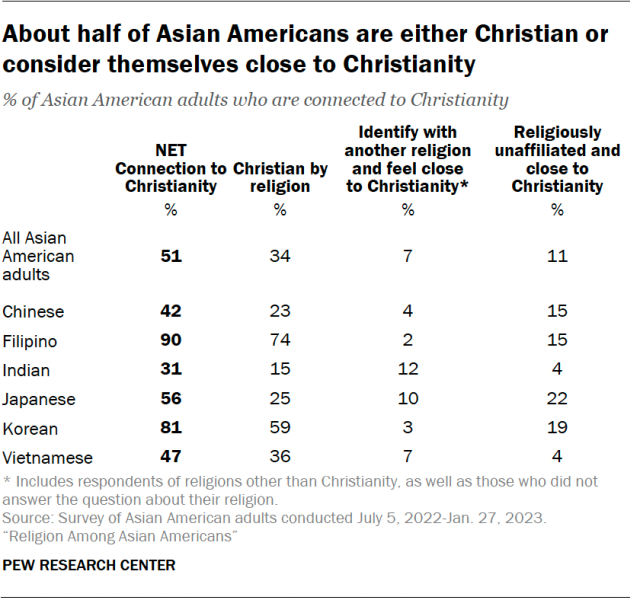
Another 18% of Asian Americans, while not identifying as Christians, say they feel “close to” Christianity “aside from religion” for reasons such as family background or culture. Combining this group with the share who say they are Christian, about half (51%) of Asian adults in the United States express a connection to Christianity. (Read more on the difference between religious identity and connections aside from religion in the Overview.)
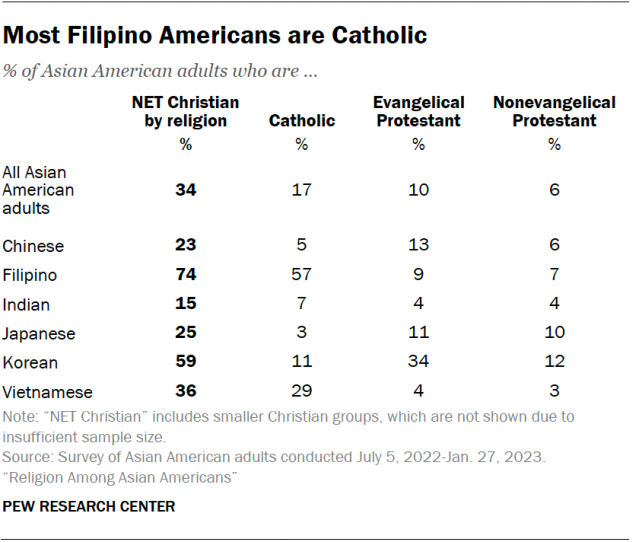
Filipino (74%) and Korean (59%) Americans are especially likely to say their religion is Christianity. When combined with those who say they feel close to Christianity aside from religion, 90% of Filipino Americans express some connection to Christianity, as do 81% of Korean Americans.
Most Filipino Americans are Catholic (57%). Korean Americans, meanwhile, are more likely to be Protestant: 34% are evangelical Protestants and 12% are nonevangelicals.
In each of the other large Asian origin groups, well under half identify as Christian by religion. Indian Americans are among the least likely of the large Asian origin groups to identify as Christian: Just 15% say Christianity is their religion.
However, all the large Asian origin groups include substantial shares who have at least some connection to Christianity. For example, 56% of Japanese American adults express some connection to Christianity, including 25% who say Christianity is their religion, 10% who follow some other religion but feel close to Christianity aside from religion and 22% who are religiously unaffiliated but feel close to Christianity.
For more on each Asian origin group, read the report’s Overview.
Importance of religion among Christians
Asian Americans who say their religion is Christianity are more likely than Asian Americans overall to say that religion is very important in their lives (54% vs. 31%).
Much of the difference is due to the views of evangelical Protestants, who are more likely than other Asian American Christians to say religion is very important to them. About three-quarters of Asian American evangelicals (73%) say this, compared with half of Asian American Catholics and roughly one-third of Asian American Protestants who are not evangelicals (32%). Thus, nonevangelical Protestants are no more likely than the general Asian American population to say religion is very important in their lives.
Similar patterns are seen in attendance at religious services. Just over half of Asian American Christians say they go to church at least monthly (55%), which is significantly higher than the share of the overall Asian American population that reports going to religious services as often (29%). Evangelical Protestants are most likely to attend monthly or more (74%). Smaller shares of nonevangelical Protestants and Catholics say they attend this frequently (45% and 48%, respectively), though both report going to services more often than do Asian Americans overall.
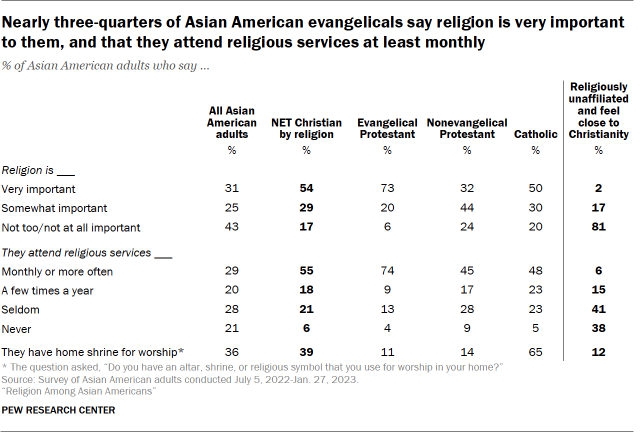
About four-in-ten Asian American Christians (39%) say they have an altar, shrine or religious symbol that they use for worship in their home, which is on par with Asian Americans as a whole (36%). However, there are differences among Christian subgroups on this measure. Roughly two-thirds of Asian American Catholics (65%) say they have a home shrine for worship, compared with 11% of evangelical Protestants, 14% of nonevangelical Protestants and 12% of religiously unaffiliated Asian Americans who express a Christian affinity (i.e., who say they feel close to Christianity, though they do not call it their religion).
Social and demographic profile of Asian American Christians
Asian American Christians are more likely than the general Asian American population to say all or most of their friends have the same religion they do (38% vs. 30%). Evangelicals (45%) are among the most likely of all religious groups analyzed to say this.
Asian American Christians are slightly older than the Asian American population as a whole. Asian American evangelical Protestants have a median age of 51, among the highest of any Asian American religious group measured in the survey.
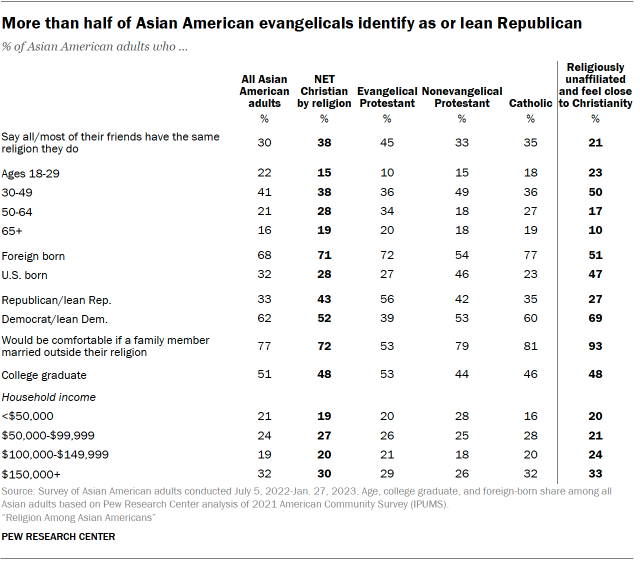
While most Asian Americans identify with or lean toward the Democratic Party (62%), about half of Asian American Christians are Democrats or Democratic leaners (52%). Evangelical Protestants, in particular, stand out as the only Asian American religious group analyzed in which fewer than half (39%) identify with or lean toward the Democratic Party.


